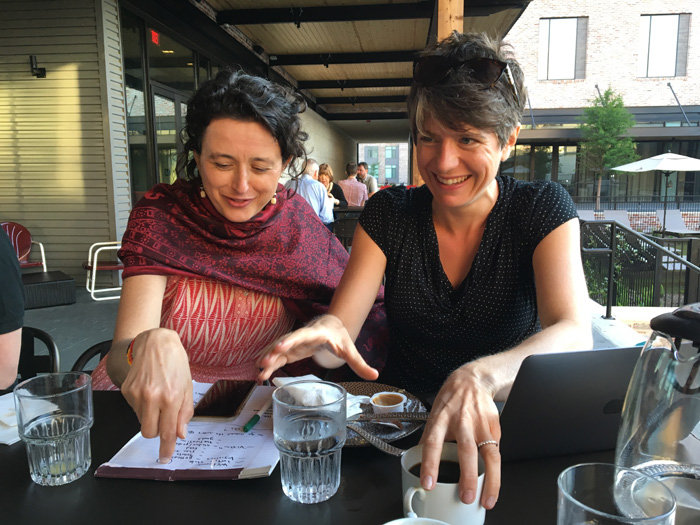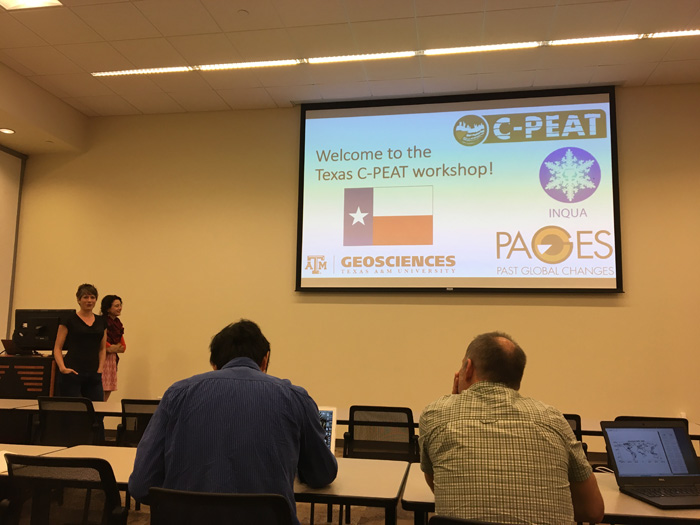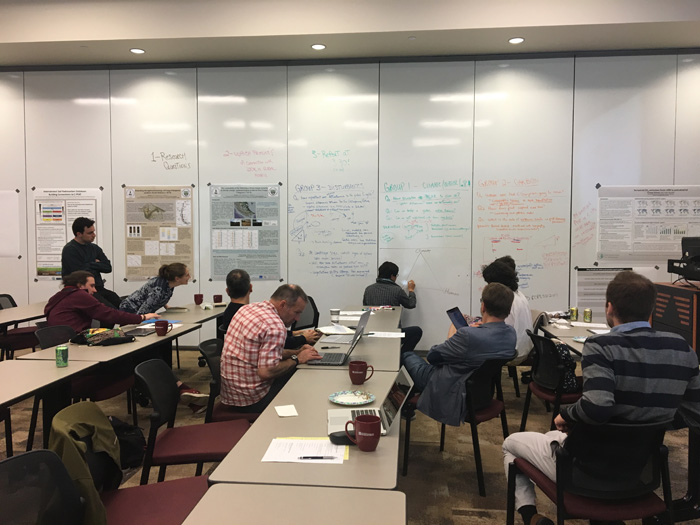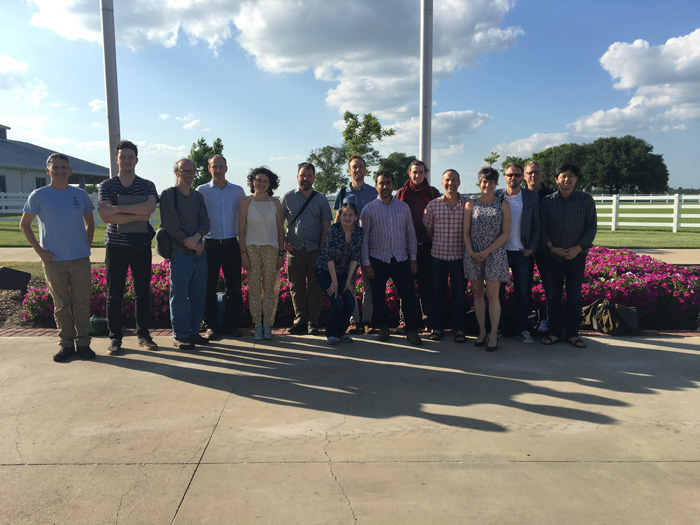
 tamu.edu
tamu.edu
PAGES' Carbon in Peat on EArth through Time working group (C-PEAT) will hold a workshop, titled "Short-Term Peatland Patterns, Processes, and Sensitivity to Rapid Climate Change" from 10-13 May 2018 in College Station TX, USA.
Venue
Texas A&M University
College Station, TX, USA
Logistics
This is a meeting for 15-20 invited participants. There is a plan to record parts of the workshop and share the videos live (see below) with a larger audience of peatland scientists who might not be able to attend.
Description
Peatlands have played a key role in the global carbon (C) cycle during the Holocene and previous interglacials. While it is well known that high-latitude and tropical peatlands have acted as net long-term atmospheric sinks for carbon dioxide (CO2) over time, key uncertainties remain regarding the short-term peatland patterns and processes that lead to C sequestration (or loss) at decadal to centennial timescales.
We know that a changing climate can strengthen or weaken the peatland C sink capacity and induce non-linear responses and feedbacks in peatland systems. However, we don’t know which factors are responsible for such changes. A better understanding of these short-term processes is essential to (1) assess climate sensitivity of peatlands’ C sequestration potential, and (2) integrate peatland dynamics in terrestrial, climate, and land-cover change models.
This specific workshop will have an emphasis on developing a forward model of peat accumulation to understand short-term peatland dynamics and system resilience; the model will be specifically designed to interpret paleoclimate and paleoenvironmental information from peat cores.
Main objectives
(1) Discuss the possible second phase of C-PEAT
Task 1- present the idea of simulating short-term (100 years) dynamics of peatlands to document the processes of peat formation and C accumulation to the group;
Task 2 - discuss the integration of peat-based data with peatland flux data from natural sites, field experiments, and laboratory incubations;
Task 3 - discuss ideas pertaining to developing a new process-based modeling framework;
Task 4 - create a calendar and a series of tasks to be accomplished by the end of the year.
(2) Develop a 'peatland sensitivity and resilience' framework to analyze peatland dynamics
Task 1 - analyze our peat-core databases (from C-PEAT Phase I) with the specific goal to develop indices to identify rapid changes in the peatland C-sink function during three rapid climatic changes that have occurred since the last deglaciation (Younger Dryas, and the 8.2ka and 4.2ka events);
Task 2 - identify key patterns and their relationship to potential controls;
Task 3 - develop a conceptual model describing peatland responses to climate change;
Task 4 - simulate peatland responses to different climate change scenarios (temperature, moisture, seasonality) using a process-based model (Holocene Peat Model);
Task 5 - assess peatland sensitivity and resilience to rapid climate change.
Planned outcomes
(1) the preparation of a peer-review article to be submitted to a Special Issue of Environmental Research Letters on carbon cycle dynamics during episodes of rapid climate change, and potentially other articles based on case studies;
(2) a better understanding of peatland sensitivity and resilience to rapidly changing climatic conditions,
(3) a new set of model simulations showing a range of peatland responses to changes in temperature and moisture, and
(4) an inclusive and participatory research agenda for the coming year that facilitates data integration and analysis, as well as collaboration between international scientists with expertise in empirical, experimental, and modeling methodologies and experience from around the world (tropical and high-latitude peatlands).
Program
Thursday 10 May (database and proxies)
0815: Arrival at Equine Complex (workshop location)
0830-0900: Welcome, introductions – Julie Loisel & Angela Gallego-Sala
0900-0945: Database: repository and protocols – Julie Loisel & her students
0945-1030: Database: discussion (data products, publications, plan) – Simon van Bellen
1030-1040: Break
1040-1100: Vegetation proxies: macrofossils – Atte Korhola
1100-1120: Vegetation proxies: biochemical markers – Mike Philben
1120-1200: Vegetation proxies and Peat decay: discussion – Gabriel Magnan, moderator
1200-1300: Lunch and poster browsing
1300-1320: Climate proxies: testate amoebae – Simon van Bellen
1320-1340: Climate proxies: stable isotopes in mosses – Jon Nichols
1340-1400: Climate proxies: stable isotopes in vasculars – Dan Charman
1400-1415: Guest lecture: Ecophysiological models and Stable isotopes – Jason West
1415-1500: Group exercise led by Jason West
1500-1510: Break
1510-1530: Climate proxies: biological proxies – Jerome Blewett
1530-1600: Climate proxies: discussion – Jon Nichols, moderator
1600-1620: GHG proxies: C and N stock reconstruction – Dave Beilman
1620-1640: GHG proxies: C and N flux reconstruction – Zicheng Yu
1640-1700: GHG proxies: discussion – Juan Carlos Benavides, moderator
1700-1720: Disturbance: Fire and Permafrost (Boreal) – Phil Camill
1720-1740: Disturbance: Drought (Tropical) – Sakonvan Chawchai
1740-1800: Disturbance: discussion – Phil Camill, moderator
1800: Departure from Equine Complex
1900-2200: Dinner
Friday 11 May (models and working groups)
0815: Arrival at Equine Complex (workshop location)
0830-0900: Models: LPX – Jurek Muller
0900-0930: Models: DigiBog – Andy Baird et al.
0930-1000: Models: HPM – Claire Treat
1000-1045: Models: discussion on proxy integration – Angela Gallego-Sala, moderator
1045-1100: Break
1100-1115: Guest lecture: Peatland modeling – Thomas Kleinen
1115-1200: Group exercise led by Thomas Kleinen
1200-1215: Brief overview of the 4 working groups, lay out deliverables & expectations
1215-1315: Lunch and poster browsing
1315-1500: Working Groups
1500-1515: Break
1515-1700: Working Groups
1700-1715: Break
1715-1800: Working Groups: progress report
1800: Departure from Equine Complex
1900-2200: Dinner
Background
This meeting on short-term peatland patterns and processes and its responses to rapid climate change will also be used to plan a proposed second phase of the working group.
The meeting will allow us to (1) utilize the data previously synthesized, (2) write at least one new community paper, and (3) plan out our research agenda and activities pertaining to 'short-term peatland dynamics' for the next three years.
Join the live webinar broadcast
Participants are welcome to join the webinar sessions. If you would like to join the live broadcast, please email the workshop organizer Julie Loisel at the Department of Geography, Texas A&M University, USA: julieloisel tamu.edu
tamu.edu
List of participants
Dave Beilman, University of Hawaii, USA
Juan C. Benavides, Pontificia University, Bolivia
Jerome Blewett, University of Bristol, UK
Phil Camill, Bowdoin College, USA
Dan Charman, University of Exeter, UK
Sankovan (Moo) Chawchai, Chualongkorn University, Thailand
Angela Gallego-Sala, University of Exeter, UK
Alexandra Hedgpeth, University of California in Los Angeles, USA
Thomas Kleinen, Max Planck Institute, Germany
Atte Korhola, University of Helsinki, Finland
David Large, University of Nottingham, UK
Julie Loisel, Texas A&M University, USA
Gabriel Magnan, University of Quebec in Montreal, Canada
Clau Mansilla, University of Magallanes, Chile
Jurek Müller, University of Bern, Switzerland
Jon Nichols, Columbia University (LDEO), USA
Simon van Bellen, University of Quebec in Montreal, Canada
Jason West ,Texas A&M University, USA
Zicheng Yu, Lehigh University, USA
Further information
Enquiries can be sent to Julie Loisel: julieloisel tamu.edu (julieloisel[at]tamu[dot]edu)
tamu.edu (julieloisel[at]tamu[dot]edu)
Post-meeting material
If you would like to join future C-PEAT activities, subscribe to the mailing list to be informed of their plans.

C-PEAT leaders Angela Gallego-Sala (left) and Julie Loisel prepare for the meeting.

A true Texan welcome.

Workshop discussions.

Workshop attendees.